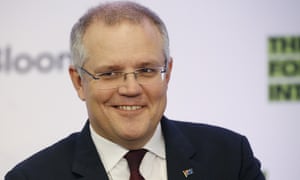Extract from The Guardian
Too much of the burden of reducing the budget deficit is falling on too few taxpayers, treasurer says
Scott Morrison after delivering his address in Sydney on Thursday. ‘There is a new divide – the taxed and the taxed-nots,’ he said. Photograph: David Moir/AAP
Thursday 25 August 2016 16.01 AEST
Scott Morrison has warned that the economy risks falling into recession if Australians become too complacent.
In the first of three major “headland” speeches he plans to deliver on the economy, the treasurer said too much of the burden of reducing the government’s deficit was falling on too few taxpayers, and on current settings more Australians were likely to go through their entire lives without ever paying tax than has been the case for generations.
“There is a new divide – the taxed and the taxed-nots,” Morrison said.
Speaking in Sydney on Thursday, he said the new parliament had to get serious about reducing the debt position of Australia’s state and federal governments, and restoring the budget to balance, so the country could have a chance of surviving future economic shocks.
But he said deficits had “proven difficult to shift in recent years” because of the “budget sabotage engaged in by the opposition during the last parliament”. The unwillingness of the previous Senate to help the government “to implement our agenda for budget repair” had also been a huge problem, he said.
He then called on Labor, the Greens and new crossbenchers to help the government pass its proposed savings measures through the new Senate. “I do not want my kids to know what a recession is and everything that goes along with that,” Morrison said.
Bill Shorten said Morrison needed to realise that the Coalition had actually won the election so he could get on with governing – rather than blaming others for the state of the federal budget.
He said Labor had suggested $80bn worth of budget savings for the start of the new parliament and a fix for the Coalition’s “superannuation issue”, and if the government was serious about budget repair it should accept them, rather than pressuring low-income workers to pay more tax.
Marking a different tone to the “spending out of control” message voters have heard in recent years, Morrison said the Coalition had expenditure in hand.
As evidence, he said the 2013 pre-election fiscal outlook had estimated that government payments in 2015-16 would be $425bn, and three years later, in the 2016 Pefo, the estimated expenditure was the same, at $425bn.
“Since the 2013 Pefo, even in nominal terms, we have kept expenditure under control,” he said.
He also conceded that the commonwealth had a significant “earnings problem” – another name for a revenue problem – because since 2013 the country had suffered larger falls than expected in the terms of trade, commodity prices, wages and profits.
“Our nominal growth today is lower than our real growth, by a full percentage point,” he said. “This is an uncommon predicament and a core challenge in working to bring the budget back to balance.”
But he warned that this should not be an invitation to “increase the tax burden on the economy”, especially on investment.
“This is why we have consistently rejected Labor’s tax-and-spend approach,” he said. “It is, however, necessary to act to protect the revenue base from structural weaknesses, to ensure the base is contemporary and ensure that taxes are paid – as the prime minister said, taxes should be as low as they can be, but they must also be paid.
“That is why we have introduced our tough new laws to crack down on multinational tax avoidance, including our new diverted profits tax introduced in the budget.”
Shorten criticised Morrison’s speech on Thursday, saying the Turnbull government had to “stop being unhappy” since the election and get on with governing. “They won the election,” he said. “They now need to start acting like a government.”
Oxfam Australia’s chief executive, Dr Helen Szoke, said it was alarming that Turnbull government planned to “demonise” the country’s poor as the “taxed-nots”, when one in three large companies reported on by the Australian Tax Office in 2014 paid no tax.
“Large multinational companies are the real ‘taxed-nots’ in Australia,” Szoke said. “Our recent research found tax-dodging practices by multinationals deprived the nation’s public coffers of as much as $6bn in 2014 alone.”

No comments:
Post a Comment